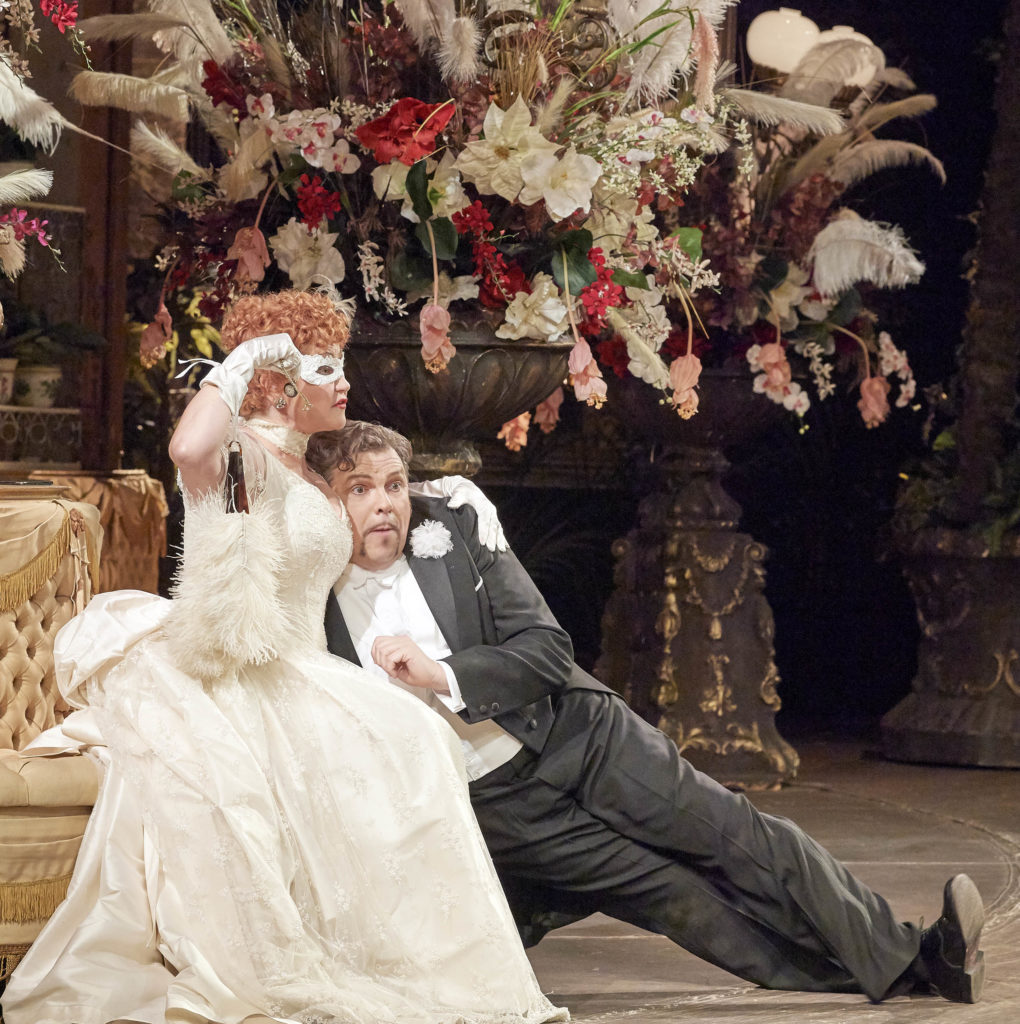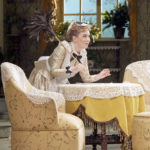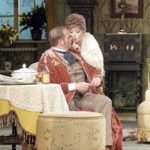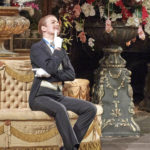 Die Fledermaus has been a staple of Vienna State Opera repertory since 1900 . Its enduring popularity has everything to do with the quality of Johann Strauss’s music, its rich melodies: but also the cleverly scripted comedy, a social satire on late 19th century Viennese society.
Die Fledermaus has been a staple of Vienna State Opera repertory since 1900 . Its enduring popularity has everything to do with the quality of Johann Strauss’s music, its rich melodies: but also the cleverly scripted comedy, a social satire on late 19th century Viennese society.
This truly classic Otto Schenk production premiered in 1979, and, newly interpreted in 2011, is sheer extravagance: an abundance of expensive furnishings and costumes to reflect the high society portrayed.
The Die Fledermaus overture, a Strauss songbook, is an entity in itself. There’s beautiful phrasing from Cornelius Meister’s Vienna State Opera Orchestra. Authentically articulated, it swings with that Viennese lilt: gemütlich, warmth and charm. Such a sense of anticipation!
Then a drawing room, with a staircase centre stage, all in beige, cream and gold tones. Adele sings the letter from her sister, ‘miles away’ in a villa . If you can, borrow a gown from your mistress, or come as you are (to the ball.) If only she knew how, sings Maria Nazarova, petite, blonde and gorgeous. She sings to Rosalinde about her aunt’s illness, feigning her upset. Rosalinde, the fiery, auburn-haired Laura Aikin, won’t buy it. In Adele’s comedic aria, why did her mother make her, Nazarova is light-hearted but affecting.
Rosalinde, the fiery, auburn-haired Laura Aikin, won’t buy it. In Adele’s comedic aria, why did her mother make her, Nazarova is light-hearted but affecting.
Meanwhile, Alfred , an old flame of Rosalinde’s creeps in. Benjamin Bruns, ‘the tenor’ -he’s some tenor- but imagine being crooned to all the time. If only he wouldn’t sing, his voice drives me to distraction, complains Rosalinde.
Eisenstein, Rosalinde’s husband arrives. Michael Schade is moustachioed, slightly paunchy, with a middle-age spread, but what a voice. Their duet about Schuld (guilt) is sensational stuff. He’s been sentenced to a week in prison for insulting an official . She’s outwardly all sympathy- how can she bear it ; but, she sings to us, he could appeal but he’d only make a fool of himself.
Eisenstein hears Adele crying again. ‘Not on his account’, he sings. (Is he having an affair?) Anyway, he saw her, Adele’s sick aunt, out-and-about, in an inn.
Dr.Falke (Clemens Unterreiner) is the mastermind of the plot- a revenge scam against Eisenstein, who’d humiliated him at a masque ball: Falke locked-out dressed as a bat. Unterreiner, hirsute, attractively bearded, a gloriously lyrical baritone, invites his ‘friend’ Eisenstein to a party at Orlofsky’s- this young Russian, who spends money like there’s no tomorrow, (and who’s complicit in Falke’s plot.) Stop worrying about prison!
Wie werde ich ertragen , the husband and wife duet – eight days apart, how will they stand it- is another highlight. They hypocritically exaggerate their feelings while they’re both scheming. Es gibt ein Wiedersehen: they’ll see each other again. She too has other plans. (Men! He’s sure to have fun in prison.)
Alfred offers her a little support, Bruns now in his host’s dressing gown, is already planning breakfast. Bruns, forever bursting into another aria, is delightfully over-played. Cue another of Strauss’s iconic duets. Glücklich ist, wer vergisst… Bruns’ tenor is magical, meltingly seductive, Liebchen, he sings. But also a comic turn. He thinks he’s got her; Rosalinde otherwise. 
And then the prison governor Frank (Jochen Schmeckenbecher) arrives to arrest Eisenstein. Alfred, in disguise, sees the funny side and he and Frank share a toast. He’s not Eisenstein, but his ‘wife’ sees a way of getting rid of him. Bored and sleepy, he’s like any husband! She tenderly kisses him; the deal is sealed.
In the Ball at Orlofsky’s (Act 2) stunning stage set, the reception area has mountains of flowers, gold-embossed wallpaper, gilded mirrors everywhere. Prince Orlofsky has millions, and everything bores him! Actually it’s mezzo Stephanie Houtzeel- a show-stopper-in a role she’s made her own. Slim, tall, in a black tuxedo, with slicked-back hair, singing in a broken Russo-German, so camp! A comic tour-de-force. As also his handsome butler (Jaruslav Pehal), in a green velvet tunic, so outre. Orlofsky, to the Marquis (Schade’s Eisenstein), Are you a man of honour? Then drink with me to your moral code. So to Orlofsky’s signature ‘Ich lade gerne meine Gäste…‘ , but what goes for himself, he doesn’t allow his guests. If any guest is bored, he’ll throw him out. Das ist bei mir so sitte. It’s his custom. He wants his guests as drunk as him; woe betide anyone who can’t keep up!
The ‘Marquise’ spots the maid. (Eisenstein to Adele) ‘Have you always been Fraulein Olga?’. – What a chamber maid! Suddenly the chorus erupts from whisper to crescendo ‘This is most amusing.’ You see this dainty lady: the Marquise takes her for a chambermaid. My dear Marquis , a man should know better. Die Hand ist so fein -she has dainty hands, a refined accent -, qualities you never find in a Lady’s maid.. The whole scene is a remarkable satire on class, a fingers-up to ‘society’.
Adele’s rebuke to her ex-master Ja, sehr komisch ist die Sache, is charmingly, feistily sung by the petite Nazarova. ‘We are all ladies together.’ Huge applause.
Schade’s Marquis excuses himself , unashamedly. Then gets involved in another farcical scene with the aptly named Chevalier Chardin– actually Frank, the prison governor. He puts on a French accent- they can’t understand a word- but they vie to outdo each other with all the French words they can adlib: Lyon, Toulouse, Moulin Rouge, Can-Can . This is far and away the funniest production I’ve ever seen.
Falke , the diabolic mastermind, introduces his special guest-a Hungarian Princess. Aikin appears, in a shimmering white ball gown, and matching white mask. She confers with Falke- the power keg will explode tomorrow.
Falke’s scheme, the Bat’s Revenge, is to expose all those who humiliated him; in so doing the target is the social hypocrisy of haute societé. No wonder the Viennese censor tried to vet the piece.
Marquis and Princess, in their disguises, meet. Eisenstein becomes obsessively interested. Do not touch me! she insists, as he tries to unmask her. How he lusts after me, she sings. Schon meldet die Liebe. Love second-time-around? She steals his wallet in her game plan. Ah, ich bin blamiert, he sings. He feels such a fool.
She not Hungarian? Cue her emblematic aria Klange der Heimat, the sounds of homeland bring tears to her eyes. She longs for Hungary. Aikin, a very accomplished soprano, singing of Hungary filling her soul, somehow lacks the élan – even on a high note.
 The stage revolves to the banqueting room, tables in a crescent. And the heart of the opera, the Story of King Champagne. Unterreiner’s Falke opens, Bruderlein und Schwesterlein, let us be brothers and sisters for all time (a Viennese Auld Lang Syne?).Truly affecting. Heutzel’s intro is picked up by an endearing chorus. We see the room is that of a palace, the balconies bedecked with exotic flowers and palm trees. The Donner und Blitz Polka reminds us that this Johann Strauss II is also the Waltz King. The whole stage erupts with couples (Vienna State Ballet) doing the polka, and forming circles of dancers; then collapsing in a heap; and on their feet again for the Fledermaus Walz. If life were always as festive as today!
The stage revolves to the banqueting room, tables in a crescent. And the heart of the opera, the Story of King Champagne. Unterreiner’s Falke opens, Bruderlein und Schwesterlein, let us be brothers and sisters for all time (a Viennese Auld Lang Syne?).Truly affecting. Heutzel’s intro is picked up by an endearing chorus. We see the room is that of a palace, the balconies bedecked with exotic flowers and palm trees. The Donner und Blitz Polka reminds us that this Johann Strauss II is also the Waltz King. The whole stage erupts with couples (Vienna State Ballet) doing the polka, and forming circles of dancers; then collapsing in a heap; and on their feet again for the Fledermaus Walz. If life were always as festive as today!
Midnight. It could have ended here, but the operetta is cleverly contrived comedy, the plot tightly wound-up like the watch Eisenstein has lost.
And if you left before Act 3, you’d miss the star turn, the jailor scene, and Frosch, traditionally a guest actor- for years played by Peter Simonischeck, now an Oscar nominee.
Frosch (Frog) is always pissed. The repartee is an ad-lib snipe at the current political scene. Always new jokes. The sound of Alfred’s (Bruns) tenor echoes from one of the cells. (Give him to a count of three to shut up!) The set comprises filing cabinets overflowing ; a staircase for all the characters who gradually find their way here. The Governor Frank staggers in and tries to sober up – full of sardonic digs at everyone. ‘Olga’ (Nazarova) and Ida arrive and Adele auditions fore Frank. She can play any role, she’ll even play the innocent , she sings. W e all applauded, Nazarova a hit.. Alfred is released . Where are you singing, Frosch asks. Vienna State Opera? (He is.) Then ,in the farce, Eisenstein arrives, dressed as a lawyer to interrogate Rosalinde. ‘The situation requires discretion’, they sing. My husband is a monster, but she won’t let him get away with it! And she has his watch to prove his infidelity. Oh! Fledermaus , release your victim! The ball guests have entered the prison, still in their black costumes, drinking champagne of course. Eisenstein begs forgiveness on his knees. It was only the champagne.
In Schenk’s magnificent staging, the success of this classiest of productions is that of the cast -a surfeit of top singers. © PR 3.1.2018
Photos; Laura Aikin (Rosalinde) and Michael Schade (Eisenstein); Maria Nazarova (Adele) ; Benjamin Bruns (Alfred) and Laura Aikin (Rosalinde); Stephanie Houtzeel(Prince Orlofsky); Featured Image, surprise guest Lidia Baich
© Wiener Staatsoper/ Michael Pöhn
